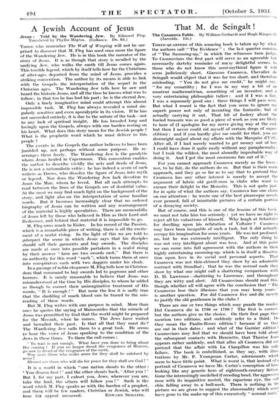Jesus : Told by the Wandering Jew. By Edmond Flag.
Translated by Phyllis Megroz. (Gollanez. 10s. 6d.) TtiosE who remember The Wall of Weeping will not be sur- prised to discover that M. Fleg has used once more the figure of the Wandering Jew. He is in this book the narrator of the story of Jesus. It is as though that story is recalled by the undying Jew, who walks the earth till Jesus comes again. This terrible legend, which by itself tells how far the Christians of after-ages departed from the mind of Jesus, provides a striking convention. The author by its means is able to link
with the Gospels the interpretation of the sequel in the Christian ages. The Wandering Jew tells how he saw and heard the historic Jesus, and all the time he knows what was to follow ; in that too he has had his part; he is the eternal Jew.
Only a finely imaginative mind could attempt this almost impossible task. M. Fleg has always revealed a mind sin- gularly sensitive and even apocalyptic in its vision. If he has not succeeded entirely, it is due to the nature of the task—not to any lack of spiritual insight. He has brooded long and lovingly upon the Gospels, always with one burden resting on his heart. What does this story mean for the Jewish people ? What is the prophetic word which he must deliver to this people ?
The events in the Gospels the author believes to have been jumbled up, not perhaps without some purpose. He re- arranges them freely. The Wandering Jew is the paralytic whom Jesus healed in Capernaum. This convention enables the author to describe vividly the acts and deeds of Jesus, He is not a rationalistic critic ; he has indeed a scorn of such writers as Drews, who dissolve the figure of Jesus into myth or legend. Nor does the Wandering Jew lack devotion to Jesus the Man, whom he loved. But all such attempts to read between the lines of the Gospels are of doubtful value. At the most we may find much light on the background of the story, and light also on the interpretation of some familiar words. But it becomes increasingly clear that no ordered biography of Jesus can be written and any rearrangement of the material is highly speculative. There are memorabilia of Jesus left by those who believed in Him as their Lord and Redeemer, and behind that material it is impossible to go.
M. Fleg owes much to Eisler. In his record of the Passion, which is a remarkable piece of writing, there is all the excite- ment of a zealot rising. In the light of this we are told to interpret the scene in which Jesus says that his disciples should sell their garments and buy swords. The disciples are made at once into possible partakers in a zealot rising
by their answer " here are two swords each." But there is no authority for this word "each", which turns them at once
into conspirators each with two daggers under his cloak. In a passage of noble eloquence M. Fleg tells how in Christen- dom that command to buy swords led to pogroms and other horrors. It is surely reasonable to believe that Jesus was misunderstood at the time by His disciples, to whom he added as though to correct their unimaginative treatment of His words, " It is enough ! " But none the less it is sadly true that the shedding of much blood can be traced to the mis- reading of these words.
But M. Fleg writes with one purpose in mind. More than once he quotes the saying of Maimonides that the miracle of Jesus was permitted by God that the world might be prepared for the Messiah, when he comes. The Jews have waited and bewailed their past. Is that all that they must do ? The Wandering Jew calls them to a great task. He seems to hear the voice of Jesus speaking to the condition of the Jews in these times. To them the call comes :
" To wait is not enough. What have you done to bring about His coming ? If you no longer dread the vengeance of Heaven, go now in dread of the vengeance of the earth.
Woe unto those who make arms for they shall be subdued by arms !
Blessed are those who will die for peace for they shall see God "
It is a world in which "one nation shouts to the other : You disarm first ! ' and the other shouts back,-' After you ! ' But I, for my part, I exhort you, Jews, wherever you are,
take the lead, the others will follow you ! " Snell is the word which M. Fleg speaks as with the. burden of a prophet, and there will be few readers, Christian or Jewish, who will










































 Previous page
Previous page